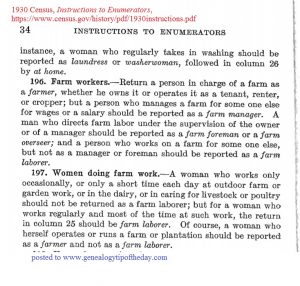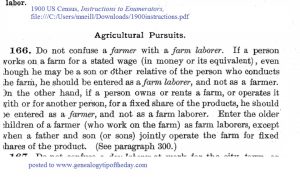An earlier post mentioned that the use of the word “farmer” to describe an ancestral occupation can be somewhat generic. It’s not a bad term. It’s just that it can be somewhat vague and that knowing a little more specifics about your ancestor’s farming status can be helpful for research.
For those with ancestors who appear in European church records, those records may list the ancestral occupation with a word that is more specific than “farmer.” Make certain you have the occupation translated accurately–it may indicate farm laborer, farm owner, tenant farmer, etc.
Estate or probate records may provide clues as to your ancestor’s farming status. Ownership of agricultural equipment is suggestive of occupation. An estate inventory or a will that includes real property would indicate that the individual was a property owner. It is possible that an estate inventory may mention farm leases on which balances are owed.
In the United States, the census may provide clues as to your ancestor’s “farming status.” Census enumerators were given specific instructions in terms of classifying an individual’s occupation. That does not necessarily mean that every enumerator followed those instructions correctly. Only 1850 census and after provide occupation. Enumerations that mention real property values would be suggestive of farm ownership as well. 
United States Census Instructions:

County plat books that list property owners may help to document your relative’s land ownership. Rural directories may indicate whether individuals are property owners or renters. These are broad, somewhat general suggestions and your search for more information on your ancestor’s farmer “status” may lead you to discover more than just what type of farmer he was.
Learn more about research, methods, and sources in Casefile Clues.







2 Responses
[…] his Genealogy tip of the day. I have touched upon this in my blog too. Read Michael’s post Determining Which Type of […]
Thanks for the shoutout, Martin!